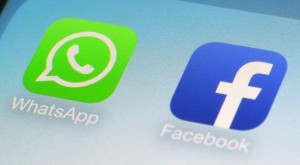
This Wednesday, Feb. 19, 2014, photo shows the WhatsApp and Facebook app icons on an iPhone in New York. AP
SAN FRANCISCO – WhatsApp was launched five years ago as a shot at doing to text messaging what Skype did to telephone calls.
If Facebook’s move to buy the startup in a cash-and-stock deal valued as high as $19 billion is any indication, the California-based WhatsApp may have hit the mark.
The firm founded by former Yahoo employees Brian Acton and Jan Koum in 2009 took its name from a play on the phrase “What’s Up,” according to its website.
They also devoted themselves to a credo of “No Ads. No Games. No Gimmicks.”
A note stating just that and signed by Acton remains taped to Koum’s desk, according to venture capital firm Sequoia, which invested in the startup early and stands to cash in big time on the Facebook take-over.
The “contrarian approach” of gathering no information about users for targeting ads was shaped by Ukraine-born Koum’s aversion to tactics of secret police in communist countries, Sequoia partner Jim Goetz said in an online note.
“Jan’s childhood made him appreciate communication that was not bugged or taped,” Goetz said.
“When he arrived in the US as a 16-year-old immigrant living on food stamps, he had the extra incentive of wanting to stay in touch with his family in Russia and the Ukraine.”
Koum remained true to those ideas when, after working at Yahoo with his “mentor” Acton, he turned to building WhatsApp, according to Goetz.
The stated mission was to build a better alternative to traditional SMS messaging in a world where smartphones were clearly becoming ubiquitous.
The founders jokingly described themselves at the website as “two guys who spent combined 20 years doing geeky stuff at Yahoo! Inc.”
WhatsApp is a platform for sending images, video, audio, or text messages for free over the Internet using data connections of smartphones.
The application is free, but after using it for a year, there is an annual subscription fee of 99 cents.
“We feel that this model will allow us to become the communications service of the 21st century, and provide you the best way to stay in touch with your friends and family with no ads getting in the way,” the startup said in a blog post discussing pricing.
WhatsApp is reported to have grown stunningly fast to more than 450 million users and said to handle 50 billion messages daily.
As of the start of this year, WhatsApp had 50 employees, more than 30 of them engineers. While the company has its headquarters in the California city of Mountain View, where Google has its main campus, most of the engineering work is reportedly done in Russia.